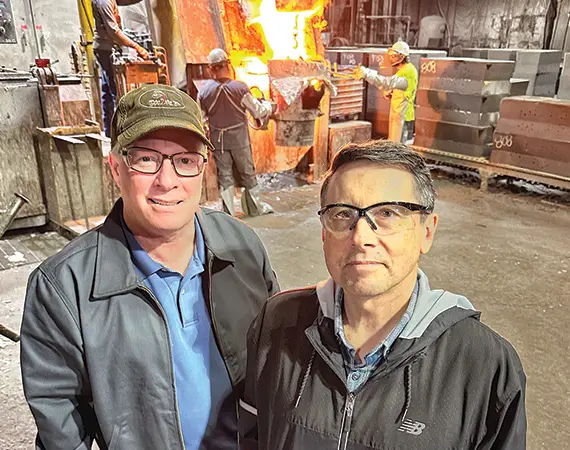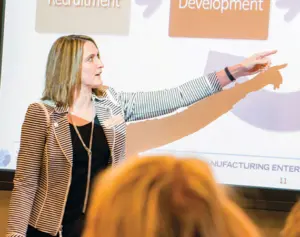Jeff Hoch turns a corner and strolls past the open flames dancing atop freshly poured molten metal at Midwest Metal Products.
Down the aisle, Jeff Thorn turns and sees Hoch approaching. His mouth stretches into a smile as he takes his right glove off and extends his arm. The two shake hands, looking a lot like old friends or longtime coworkers.
They are neither.
Hoch is a chaplain, hired by Midwest Metal Products to counsel employees on personal matters. Thorn works in the floor molding production area at Midwest Metal. Hoch comes around a few times a week to check in. Thorn is a frequent stop.
“I like talking to Jeff,” says Thorn. “He’s an easy-going guy, easy to communicate with.”
Hoch is there to be a sounding board. He listens to people when they have the kind of problems they maybe don’t want to bring to supervisors. He lets people vent about their home life or relationships, things they maybe don’t want to bring up around the water cooler.
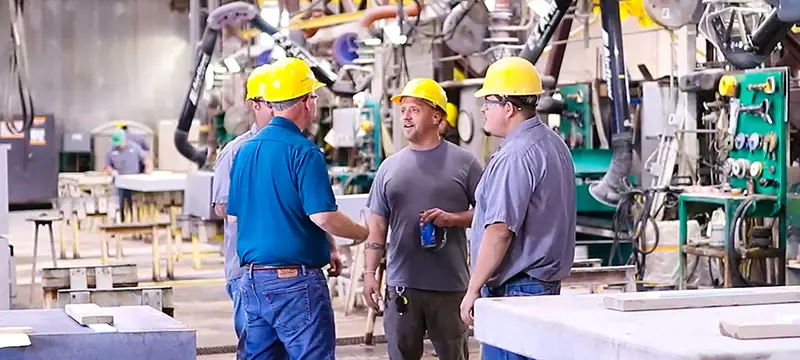
And for some, like Thorn, Hoch is a friendly face and a firm handshake who won’t judge. Sometimes that’s all he needs.
“It’s almost like a little safety zone, if that makes sense,” Thorn says. “Like a little timeout area where you can just talk about problems if you need to.”
Hoch’s presence at Midwest Metal isn’t some unique idea from the mind of company president Joe Plunger. The use of chaplains is actually a growing phenomenon around the country as companies, including manufacturers, take steps to help employees cope with stress.
The goal, chaplains say, is to give workers opportunities to have what can often be difficult conversations, the kind not appropriate to have with a supervisor or coworkers. Marital problems, financial struggles, depression, or even job-related stress and anxiety all fall under the umbrella of things chaplains are eager to help with.
And in today’s competitive labor environment, it makes sense for employers to do whatever they can to keep employees happy and healthy — both physically and mentally. Happy workers are better workers. And it doesn’t hurt that offering the services of a chaplain sends a message that the employer cares about the people it hires.
Crisis intervention
Rev. Larry Forsberg was a full-time pastor for 30 years. During that time, he’d seen some of the more unique aspects of ministry.
He’d worked in the state prison system helping men transition from incarceration to freedom. He’d also worked in a senior living community. He retired in 2019 from full-time ministry. Sort of.
“I failed at retirement,” he says with a laugh.
That failure came at the hands of Marketplace Chaplains, an organization that has put chaplains in workplaces in every state in the nation as well as Canada and Mexico.
After retirement, an acquaintance who happened to work with Marketplace Chaplains asked if Forsberg was truly ready to give up helping people. After a short period of thought, he realized he was not. So, he contacted Marketplace Chaplains and went through the process of becoming a workplace chaplain.
“I don’t like sitting around doing nothing,” he says.
Once Forsberg got going with Marketplace Chaplains, he learned quickly this wouldn’t be an easy retirement gig, and that was fine by him.
“It’s helping people out with their personal problems,” he says. “They’re facing emotional or relational issues. It’s really a one-on-one personal thing. We’re not there to teach them about the Bible. We’re there to help them process their life and difficulties and make them a more healthy employee.”
Sometimes, Forsberg says, the need for help is dire.
When Forsberg visits companies repeatedly he says he’s able to establish relationships. In some cases where individuals appear in need of additional help or attention, Forsberg will exchange cell numbers. And in one recent case, having an employee’s cell number paid off.
There was a gentleman at a company Forsberg was assigned to, a company where he’d made repeated visits and established relationships, who was having problems at home — problems that had resulted in some dark thoughts. He reached out to the man, and reached out to authorities who were able to step in and help.
“I was there at the right time and helped prevent it,” Forsberg says. “I called the right sheriff and he intervened and found the man. Thank goodness that was not a completed disaster. And that’s happened to me about three times in the last three years.”
Forsberg says his help runs the gamut of goodwill. He says he’s helped client employees plan funerals, and he has visited incarcerated loved ones on a client employee’s behalf. In one case, where an employee’s work schedule wouldn’t allow it, Forsberg lined up a visitor for an employee’s mom who was battling stage 4 cancer in a hospital.
“I said, ‘Do you mind if I get somebody to go see your mother?’ and she just broke down in tears,” Forsberg says. “That meant an awful lot to the employee.”
This kind of work doesn’t always mean direct involvement. In many cases, the protocol for Marketplace Chaplains dictates referral to outside resources. If an employee needs more help than a chaplain can provide, it may mean referral to a marriage or financial counselor. It might mean help from an anger management professional, or referral to counseling.
But in most cases, having a chaplain around — with a friendly face and a career’s worth of experience listening to people’s problems and dispensing advice — is enough.
“I’ve gotten calls on weekends and nights and I take them every single time,” Forsberg says. “I never say, ‘Call me later.’ I would never do that. And so that’s what we do. We are available for the employee to talk about the crisis that he or she is facing.”
Part of the team
At Coldspring — a family-owned business that makes monuments and other structures from granite, limestone and sandstone — they’ve taken the idea of a workplace chaplain to the next level: He’s on staff.
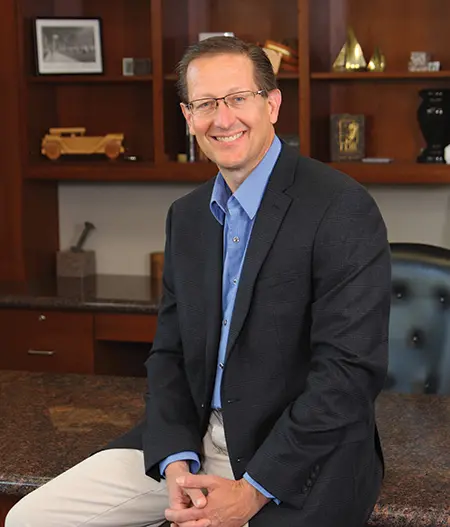
Company president Greg Flint has been with the company for 40 years. The company itself has been in operation for 125 years. Flint says the company’s existential mission is to thrive for another 125. In order to do that, he says, managers need to focus on, and take care of, the people who work there. They do that by deploying a theory called “well-being six.” This theory breaks down human well-being into six areas: autonomy, environmental mastery, personal growth, positive relations with others, purpose in life, and self-acceptance.
“When an employee has a gap in well-being,” Flint says, “it will cause them to not be able to engage in the work that they’re doing. If someone’s dealing with a health problem, can they really be focused on the job and contribute to the job? Our belief is that it’s our job to serve those employees.”
The COVID-19 pandemic, Flint says, brought into focus that some employees were struggling in certain areas of well-being, including social and spiritual well-being. The question for Flint and Coldspring became, “What’s the best way to help these employees?”
“That’s when we realized we needed to bring in someone who is skilled in those other areas,” Flint says. “And that someone else is a chaplain.”
Coldspring isn’t the only place where COVID-19 took a toll on people’s well-being.
The Centers for Disease Control and Prevention notes mental health diagnoses and substance abuse rates went up during the pandemic. Suicide rates also climbed, and continue to rise, since the pandemic’s onset. In figures reported in February, 38% of adults ages 35-49 reported having symptoms of anxiety and/or depressive disorder. For younger adults — those ages 18-24, that number is 49%.
The latter ages represent a substantial chunk of anyone employed by a manufacturer, making Flint’s move look like a shrewd one.
Coldspring hired Jeff Lawson as a full-time chaplain. Flint says Lawson was brought in to tackle those social and spiritual well-being issues, but he’s since been helpful as employees sort through personal issues that can affect all areas of well-being.
“Sometimes addressing inner peace will reveal there’s a financial problem. Or maybe there’s a social problem, maybe their kid’s getting bullied at school, maybe there’s a health problem,” Flint says. “So, the chaplain actually ends up affecting all the dimensions. From that standpoint, he is engaged in a lot of different stuff.”
Like Forsberg, Lawson sometimes gets the kind of calls no one wants to get.
“We have an employee whose son committed suicide,” Flint says. “Lawson was the guy who got the call from that employee’s dad at two in the morning.”
Lawson has also made frequent visits to hospitals and nursing homes to visit employees’ loved ones. Chaplains can, in essence, become conduits between the employee and his or her family.
“There were times Lawson spent a whole day in the hospital helping a family,” Flint says.
Flint adds that Coldspring also has an employee currently fighting cancer. Lawson has visited that employee every week, keeping that employee’s connection with Coldspring.
Abbey Hellickson, a business growth consultant for Enterprise Minnesota, says she first heard of manufacturers using chaplains during one of Enterprise Minnesota’s peer council sessions. Peer councils allow executives of small and medium manufacturers to talk candidly about issues or challenges they’re facing, and get real-time feedback from peers.
At a recent session, when the issue of dealing with mental health challenges was raised, one manufacturer said the company had been using a chaplain to help with employee morale and wellness.
“We care about their whole self, right? So, we’re concerned about the lives of our employees in and outside of work,” Hellickson says. “It helps create that environment that we want you to be your best here and in your personal life.”
Hellickson says having a chaplain available to employees can also be a valuable retention tool. A display of next-level care, Hellickson adds, is certain to stick in a worker’s mind. People want to work for a company they think cares about them.
Life coaching
Joe Plunger is president at Midwest Metal Products in Winona. He’s been using a chaplain — Jeff Hoch — for several months.
Plunger says the idea for using a chaplain sprouted organically when various managers noted that a number of new or veteran employees needed the kind of help the company wasn’t qualified to provide. The problem was especially apparent in the COVID era, a time when Midwest Metal, along with many other manufacturers, struggled to fill labor forces.
“The description one or two people in my group used was, ‘They could use life coaches,’” Plunger says. “We’re finding out they have other problems, other situations that they’ve gotten themselves into and they could really use some life coaching on how to get some things done.”
Not long after that discussion, Plunger says he heard about manufacturers using chaplains to address some of those concerns. He contacted Marketplace Chaplains, and signed a one-year contract to have Hoch come to Midwest Metal several times per month.
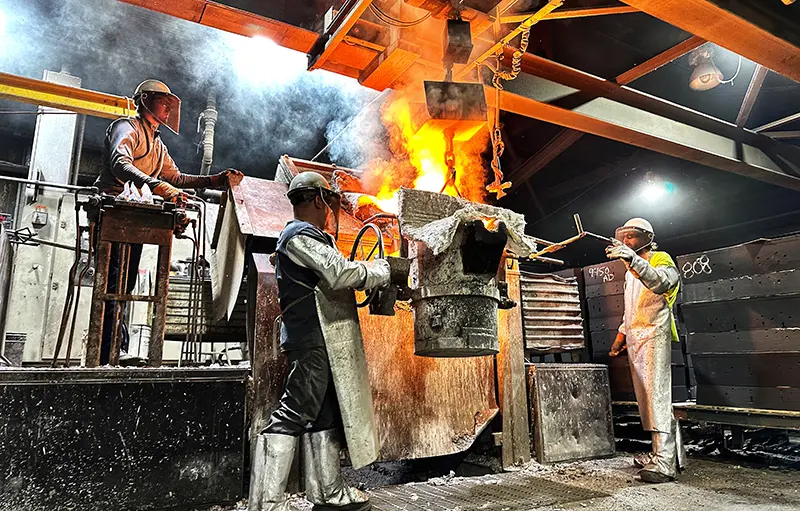
Hoch makes his rounds and, when he’s done, he fills out a comprehensive and confidential report that Plunger can evaluate to gauge the program’s progress. The report includes information such as types of issues discussed, emails and text messages to and from the chaplain, referrals to outside agencies (if necessary), and other details.
When workplaces contract with Marketplace Chaplains, they have a choice of how they want the service presented. They can present as chaplains or, if a workplace wants to keep things secular, they can present as care partners.
For Plunger, it’s chaplain.
“I am a person of faith, and it fit with my thought of trying to care for the flock, if you will,” he says. “I look at the business this way: If we have 45 people here, I’m one of them. I have 44 other people and their families who I’m responsible for providing a living to, and I want to do the things that help all of us succeed in that.”
At the same time, Plunger says he has no intention of pushing religion onto anyone. It’s a service to help people, simple as that.
“The idea was to find a resource that could handle those questions that are beyond the capabilities of us as an employer,” he says. “We’re not marriage counselors. We’re not financial counselors. And some people are too proud or too embarrassed to talk to a manager or a co-worker. So, we give them an outlet.”
That outlet is Jeff Hoch. And for workers in a foundry, they got the right guy. Hoch, himself, worked in a foundry for several years. He also worked on a pig farm, has been a firefighter, and did a stint in the military.
As a chaplain for Marketplace Chaplains, he has two assignments. In addition to Midwest Metal, he visits a poultry processing plant in Arcadia, Wis. Coming to Midwest Metal, that foundry experience was helpful in relating to the hard work that goes into that profession.
“It gave me such a respect for the people who work here,” Hoch says. “Somebody could tell me they’re really struggling in their job, and I totally understand. It’s a hard job, and they deserve a lot of respect.”
In Hoch’s early days at Midwest Metal, he recalls watching a worker from across the shop floor. The worker was visibly angry, throwing things around his work area, clearly troubled. Hoch approached.
“He goes, ‘I have a problem with anger. Can you help me?’” Hoch says. “And so we talked for quite a while that night and that led to finding out more about his life, where he’s at, and that he needed some help and support. I did my best to provide resources here in the community, and I think that helped him. We still correspond quite a bit.”
